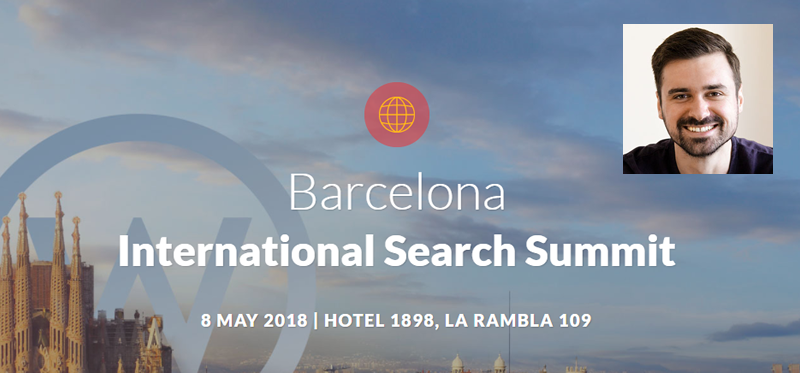The International Search Summit Barcelona is taking place on 8 May 2018. Covering a wide range of international search marketing topics and challenges, the conference is highly recommended for marketers and SEOs managing international websites and running global campaigns.
We’ve asked one of our speakers – Eoghan Henn from searchVIU – what attendees will gain from his talk and why people should attend the International Search Summit. Here’s what he had to say!
What do you think are the biggest challenges in international SEO in 2018?
SEO is evolving at an amazing pace right now and the most important new challenges in 2018 will probably be related to JavaScript SEO and mobile-first indexing, but these are not specific to international SEO. I believe the biggest challenge in international SEO will continue to be the same it has always been: finding the right balance between a global and a local approach.
A global approach to international SEO is one where strategy and tactics are defined centrally for all markets and languages, which results in lean and simple processes, but does not account for local specifics very well. A local approach, on the other hand, means that each market or language develops its own strategy and tactics, which are adapted to the local requirements.
Let’s have a look at an example: content creation. Content can be created centrally and then translated and localised for all markets or website versions. The advantages of this approach are the simplicity and scalability of the process, but important differences in local requirements for content might be disregarded. An alternative is allowing the teams working on every market to create their own content, which results in perfectly custom tailored content for every local audience, but might not leverage possible synergies between the involved markets.
The challenge, and the best solution in most cases, is mixing both approaches and finding the right balance for your business’ individual situation. International SEO should apply a global, centrally-controlled strategy, which leaves enough room for local adaptations. The teams or team members that are responsible for the different markets should work closely together, in order to exchange ideas and experiences. This way, every market can apply tactics that are adapted to the local requirements, but also share resources and knowledge with the other markets, whenever possible.
Geo-targeting is always a central topic in any international SEO discussion. Why is it so challenging to get right?
Geo-targeting is a difficult topic because it influences and is influenced by a number of strategic, structural and technical questions:
-
Where are the users I want to target?
-
Which audiences need or deserve their own website version and content?
-
Which markets or audiences can be grouped together?
-
How do I host the different content versions?
-
Which domain set-up do I choose?
-
Do I use IP and browser language-based redirects?
Once these difficult questions have been answered, setting up the actual geo-targeting is normally pretty straightforward. The implementation of hreflang or the international targeting settings in Google Search Console are not as complicated as they might seem. The complexity stems from the questions mentioned above, so simplicity should always be the goal when designing international or multilingual structures.
It is normally desirable to reduce the number of different versions of your content to the absolutely necessary minimum and to refrain from often unnecessary technical features like IP-based redirects, in order to achieve a maximum of simplicity for users and search engines.
There are various approaches available, when determining which geo-targeting strategy to adopt for a website, what are the main factors to take into account?
Again, it’s probably always desirable to aim for a maximum of simplicity, but the optimal geo-targeting strategy normally also depends on individual factors for every business.
The internal structure of the company, for instance, has an impact on which international strategies make sense or are feasible. A globally operating company with offices and teams in different countries might have the resources and knowledge it takes to create and manage content versions for different countries. If there’s just one global office in one location, on the other hand, with teams that are responsible for big geographic regions (like EMEA or APAC), instead of single countries, it might be a better solution to go with global language versions instead of country versions.
Another factor that plays a role is the heterogeneity of the international target audience. In some industries, like very specific B2B niches, potential clients from all over the world behave more or less the same: they use the same keywords when they search for your products or services, they expect the same type of content, they might even all speak the same language (English) at work. In other sectors, you might have to adapt your SEO strategy and content a lot more to local market requirements, when there is a high global diversity in user behaviour and expectations. This is probably more common for businesses that serve mainstream B2C topics.
And of course you have budget, time, and resource restrictions that play a crucial role. Even if a hyper-local approach within the boundaries of your global strategy would make sense in some or all of your target markets, it’s simply not always possible to go into detail that much. A good strategy cannot be executed very well if it doesn’t match the resources that are actually available. In most cases, the best strategy is one that takes the available budgets into consideration and stays within what’s realistically achievable. In international SEO, like so often in life and business, a bird in the hand is worth two in the bush.
What about when determining the best structure for a global site, which considerations should be made?
I believe that global websites should almost always aim for the lowest possible number of different country versions. We should ask ourselves which countries really need their own website versions and which can be grouped together. I have seen far too many cases of global websites that had lots of different country versions with hardly any differences in their content. These small differences normally don’t justify the additional resources needed to maintain the website and also the technical overhead you create for bots crawling your website and users trying to find their way around it.
Additional language versions, on the other hand, almost always provide added value for your users and also for your business. Adding a new language version to your website opens up a whole new world for your business and depending on your industry, you can reach millions of new potential clients with just one new language version.
One important thing that should be considered before adding a new language version to a website is whether you can offer the full user experience package, including customer support. Once you have a new language version up and running, people will be contacting your company in the language your website is speaking to them, so you should be ready for the conversation. This means that a new website version is not simply done by hiring an external translator. You normally need an internal team that speaks the language of the users you are targeting.
When it comes to deciding which language versions should be added to your global website next, market research is probably the best way to go, but this kind of data is not always easily available. One very simple thing we did with a former client of mine was looking at the browser languages of the users that were already visiting our website that were not represented on the website yet. That way we knew which languages or audience spoke that our content hadn’t been translated to yet. This is a custom report in Google Analytics that can be set up within two minutes, but it provides invaluable insights and helps make important business decisions.
When creating a new language version, it is also an option to only translate key content in the first phase, instead of deciding to provide the entire web platform in a new language straight away. One tactic that has worked well for me in certain cases is starting every new language version with just a home page without navigation that contains the most important information about the business and its products or services and a clear call-to-action. This page can be linked with the home pages of the other languages via hreflang and normal language switcher links and it normally starts ranking and converting well for branded queries in its language very quickly. Once there’s some traction in the new language, you can decide whether you want to build an entire website version on top of this first landing page.
What will ISS attendees learn from your talk?
My talk is about switching from an international ccTLD strategy to a global gTLD strategy. We will look at some cases where such a switch worked very well from an SEO point of view, but we will also talk about the pitfalls and about cases where it might not be a good idea to switch from several country domains to one international domain.
I will also share some advice on the structure of the new global website and mention some important things to take care of when planning and executing the actual website migration.
And why should people attend the International Search Summit?
International SEO is a very broad topic that touches almost all areas of “normal” SEO, because having an international and multilingual audience makes most aspects of SEO even more complicated than they already are. When you work on SEO in an international business environment, you face some very complicated challenges every day and it is not always easy to find good answers to those questions online
What I find most interesting about International Search Summit is that it brings together people that work in SEO and other digital marketing disciplines, such as online PR and PPC, in highly international environments. I’m looking forward to learning lots of new things from the other talks and from the people I meet and have a chat with in between the presentations.
Eoghan Henn is the co-founder of searchVIU, a software start-up that is developing a tool for advanced SEO. He is passionate about SEO and web analytics and also works as a digital marketing consultant and lecturer.
As well as Eoghan’s session on global domain strategies, other speakers and topics at this year’s International Search Summit Barcelona will include: Michiel Das talking about voice search, Bill Hunt who will talk about missed opportunities in international search and Jeroen Maljers who will discuss B2B PPC campaigns. The event will also feature a Q&A session with Gary Illyes from Google.
Feeling tempted? You can still buy tickets for International Search Summit Barcelona here! Early bird rates end 22 April 2018.
Gemma Houghton
Latest posts by Gemma Houghton (see all)
- Watch the recording: How to identify and seize growth opportunities in international markets - April 20, 2022
- International marketing recruitment: How to drive global growth amid The Great Resignation - February 23, 2022
- 5 trends to include in your 2022 international digital marketing strategy - December 21, 2021







[…] domains actually have something to share with each other and if you’ll be able to define an aligned international SEO strategy for all markets. If you’re only trying to transfer your domestic market’s good SEO […]